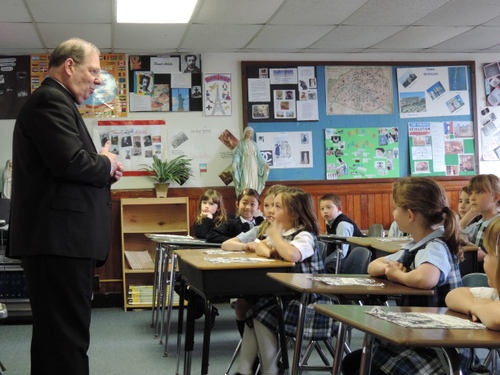From the Bishop - July 2014
 A Vital Need to Nurture Vocations
A Vital Need to Nurture Vocations
One of the joys of my ministry during these first months in the diocese has been my visits to our schools. I am grateful to all who work so hard to support these Catholic schools and to administer them. And we can never say enough about the dedication and generosity of the teachers who have chosen to teach in a Catholic school. As I visit the children, I give them the opportunity to pose questions. They want to get to know me, and their questions indicate what is important to them. They seem, for example, to be keenly interested in my favorite food or color! But they also ask me about my life as a bishop and how I got to be a bishop. Inevitably, this leads to the question of when I decided to be a priest. It is always interesting to watch the attentive faces of the children as they listen to me tell them my vocation story.
I tell them that I first experienced some draw to priesthood when I was very young, probably their age. As an altar server, I came to know the priests in my parish and was impressed with what they did for people and the way in which they wanted to serve the parish. From a young age, there was something in the back of my mind suggesting that I wanted someday to be one of them. As I drew near the end of high school, one of the parish priests who had been a mentor and guide throughout school asked me if I had thought about priesthood. Hearing someone else suggest that I might have a vocation helped me to listen more carefully and prayerfully to what God might be asking of me and to move to approach the seminary for acceptance. I always remember my mother's advice to me the day I departed for the seminary. She knew that it was a place to test a vocation, so she made it clear that, should I decide it was not a life for me, I was always welcome at home. The seminary is a kind of testing ground. It is a place of discernment where a young man can learn more about himself and what God wants of him.
Over the years, as I have listened to seminarians and priests, I realize that my story is not much different from theirs. A vocation to priesthood or religious life is nurtured in a home, in a family, within the community of the parish, and, in some cases, under the guidance of those involved in Catholic schools. Here in our diocese, this year has been a great grace. We have ordained three priests for the diocese, one man has been ordained for the Dominicans, one woman has made her profession of perpetual vows with the Franciscan Sisters of the Renewal, and another will be entering religious life in September.
Those numbers, though a blessing, are still insufficient to meet our future needs. But what my vocation story points out is that the resolution to our problem is a matter which needs the attention of all of us. I still believe that the call from God to serve him as priest can begin at a young age. It can come, in fact, at many points in life, but often, those who enter the seminary later in life speak of experiencing some call much earlier in life. The call, however, has to be nurtured and nourished by the family and the community, particularly the parish community in faith formation programs and altar server opportunities as well as positive presentations of the importance of vocations to us all. Families also play a vital role in encouraging vocations as parents validate such a choice on the part of their children and foster prayer in family life. In this regard, knowing how difficult it is to keep schedules, I always suggest that families can pray before meals, thanking God for the gifts received in the course of the day. It reminds children that so many things in life are a gift, and we can be grateful to God, the One who creates us and sustains us for the good things we enjoy. Families, of course, who assure that Mass is a part of the family’s weekend, also help our young to know that we have no better friend than the one we meet in the Mass, Jesus, who loves us and wants to assure us of the Father’s care for us.
In this edition of Harvest, we celebrate the gift of vocations in our diocese. But, in this regard we need to work harder to increase their number. And it is the Second Vatican Council which tells us, “the duty of fostering vocations falls on the whole Christian community; the members of the community discharge this duty principally by living full Christian lives” (Decree on Priestly Formation).\
Most Rev. Robert P. Deeley, J.C.D.
12th Bishop of Portland










